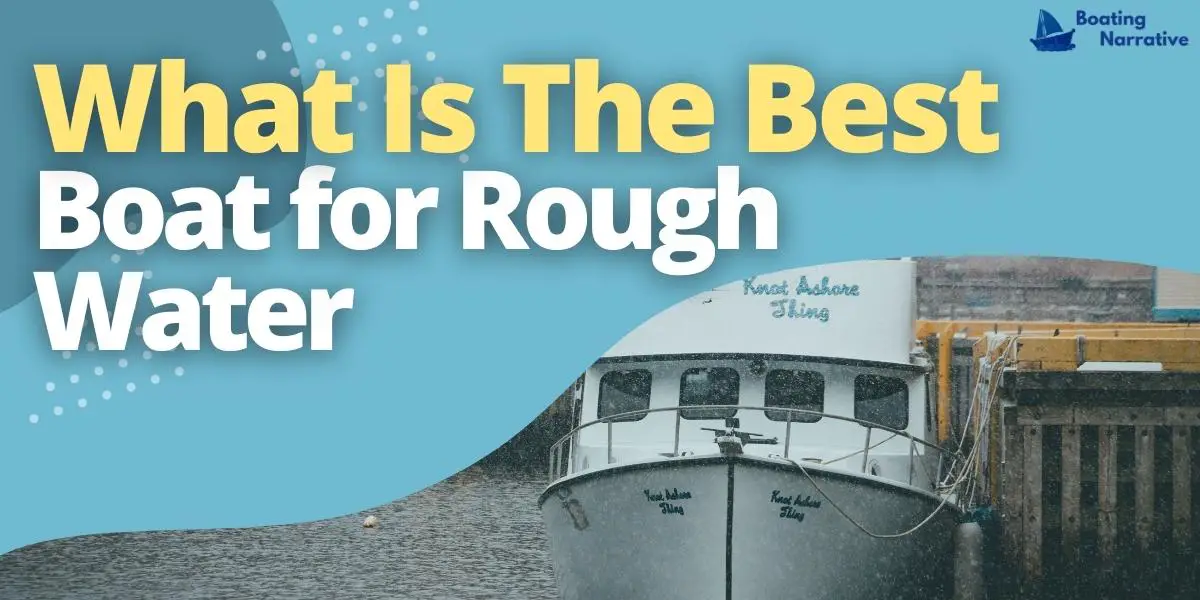If you’re interested in boating, there are several different types of boats out there. If you love boating, you’re probably interested in knowing which boat works best for rough water.
Do you want to enjoy boating, but you’re not sure which type of boat is best for rough water? Do you want to learn more about boats? In this post, we’ll take a look at the different types of boats, as well as the different types of boats that are best for rough water.
In this article, we’ll help you decide which type of boat is best for rough water.
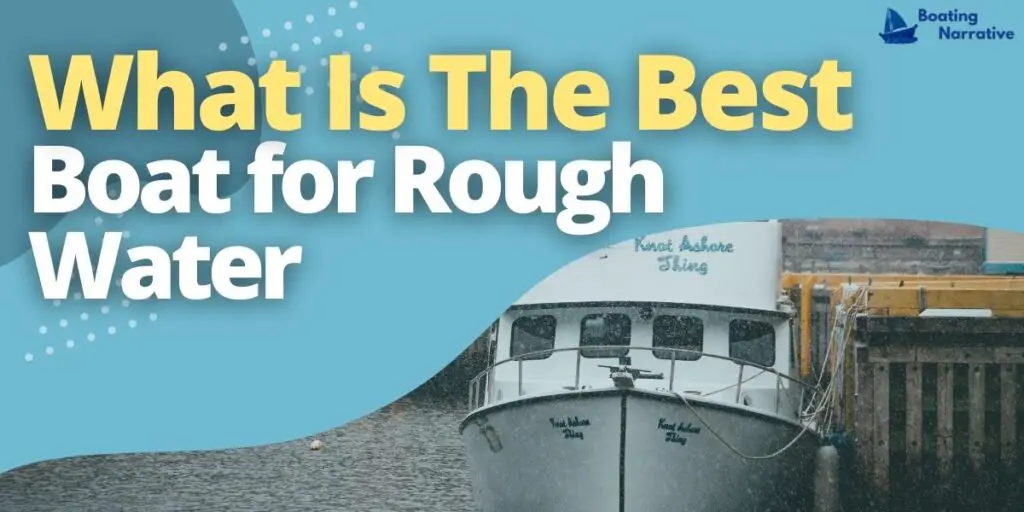
Here’s The Answer To What Is The Best Boat For Rough Water:
Aluminum-construction hulls are best for rough water, as are boats with semi-displacement hulls. Proper weight distribution also helps.
Sailing boats are a great choice for rough water. They are built to be in the water, whether that’s sailing through rough seas or crossing a river.
What Do You Need to Look For in a Boat for Rough Water?
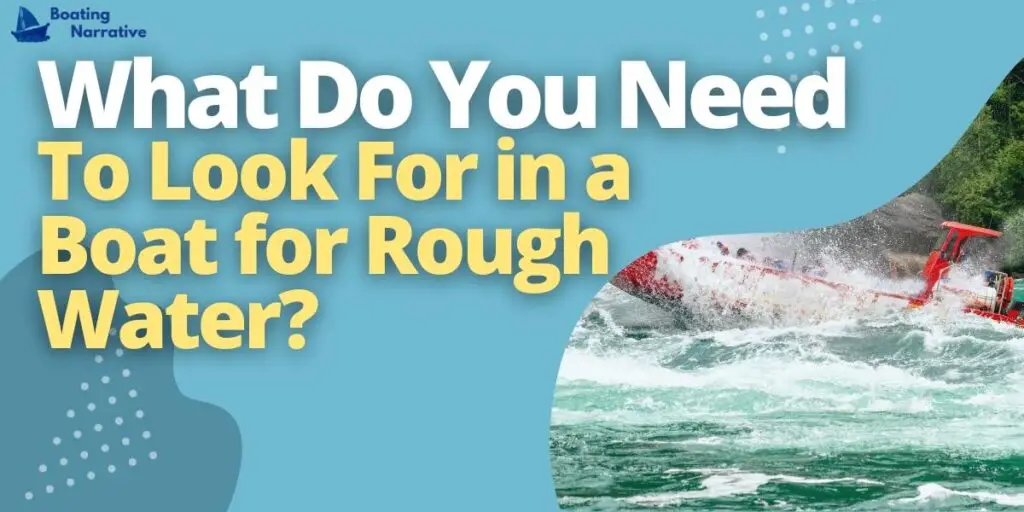
When you’re looking for a boat that can handle rough water, there are a few things you need to keep in mind. You need to design the hull in a way that is appropriate for the conditions.
A center console is a good choice for rough water because it is easy to handle and stable. The size of the boat also needs to be right for the weather. A smaller boat will be more maneuverable in rough water, while a larger boat will be more stable.
You also need to think about how the boat’s hull looks. A boat with a good hull design will be able to handle rough conditions better than one with a poor hull design. The hull should be designed to provide good buoyancy and stability in rough water.
Finally, you need to make sure that you’re in the right place when you’re boating in rough water. The wrong boat can be as dangerous as the wrong place. Make sure you know the conditions and choose a safe place to boat.
Boat Types
People can use many different types of boats in rough water, but not all of them are created equal. Some boat types are better suited to choppy conditions than others. Here are a few things to consider when choosing the best boat type for rough water:
- Monohull vs. Catamaran vs. Trimaran
- Beam Ratio
- Cockpit
- Deep-V Hull
- The Bow
- Transom
- Center Console Boat
Almost all boats have monohulls, and they are typically a good choice for rough water. Catamarans and trimarans are both stable platforms, but they can be more difficult to maneuver in rough conditions.
The beam ratio is the width of the boat divided by the length. A boat with a higher beam ratio will be more stable in choppy conditions.
The cockpit is the area where the captain and crew sit. In rough water, it is important to have a cockpit that is enclosed and has good visibility.
Deep-v hulls are designed to cut through waves and provide a smooth ride. They are a good choice for rough water, but they can be difficult to maneuver in tight spaces.
In a boat, the bow is the front. In rough water, it is important to have a bow that is designed to cut through waves.
Boat Sizes
Because rough water can make it hard to find a good boat, you need to think about how big the hull is. A small boat with the right hull design can face the waves just as well as a bigger boat.
However, the size range of rough water boats can vary significantly, so it’s important to find the right size for your needs. There are two main types of rough water boats: small boats and big boats.
Small boats are typically between 10 and 20 feet long. They’re easy to maneuver and can be a good fit for those who want a smaller vessel. Big boats, on the other hand, are usually over 20 feet long.
They have more space and can accommodate more people, but they can be harder to handle in rough waters. When choosing the right size boat for rough waters, it’s important to consider your needs and the size of the waves you’ll be facing.
If you’re not sure what size boat is right for you, a hybrid option may be a good choice. Rough water boats come in a variety of sizes, so there’s sure to be a good fit for everyone.
Boat Designing Features
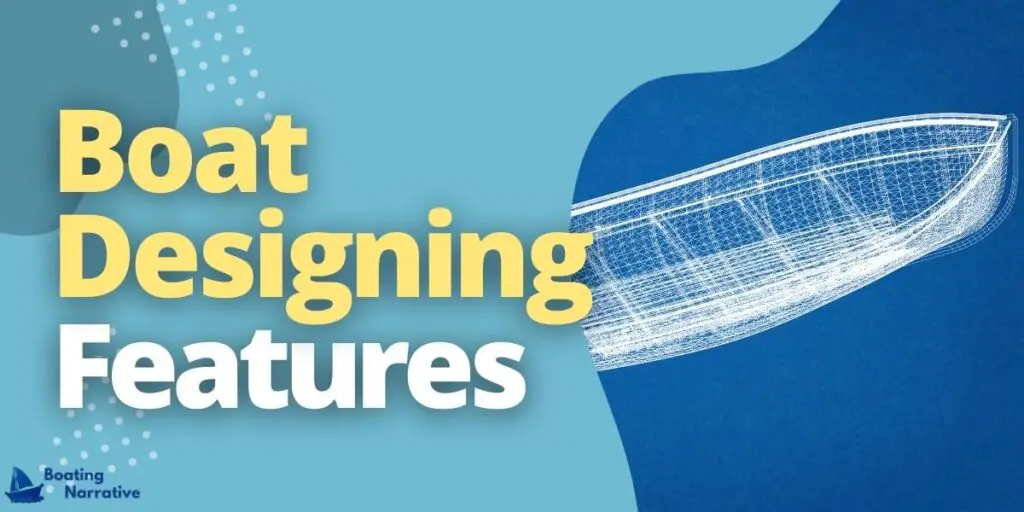
There are a few factors to look at when you choose the best boat for rough water. The first is the hull design. A flat bottom or shallower draft is a good idea for rough water. Intrepid boats are popular for their hull shape.
The wedge design is a good idea for rough water because it helps the boat face the waves.
The second thing to consider is the trim tabs. Trim tabs help the boat ride higher in the water and make it easier to maneuver.
The third thing to consider is the hull shape. The face of a wave is very important in rough water. A hull that is V-shaped is a good idea because it will cut through the waves.
Boat Material
Fiberglass is the most popular material for rough water boats because it is strong and durable. It is also a dry ride material, meaning it will not get wet in the ocean waters.
Aluminum is another popular choice for rough water boats because it is lightweight and has a good dry ride. Carbon fiber is also a good choice for rough water boats because it is strong and lightweight.
Wood is not a popular choice for rough water boats because it is not as strong as fiberglass or aluminum. However, some people believe that wood boats have a better dry ride than fiberglass or aluminum boats.
There is no right or wrong answer when it comes to choosing the best boat build material for rough water. It depends on the boater’s preferences and what they are looking for in a boat.
Factors Impacting Boat Performance In Rough Water
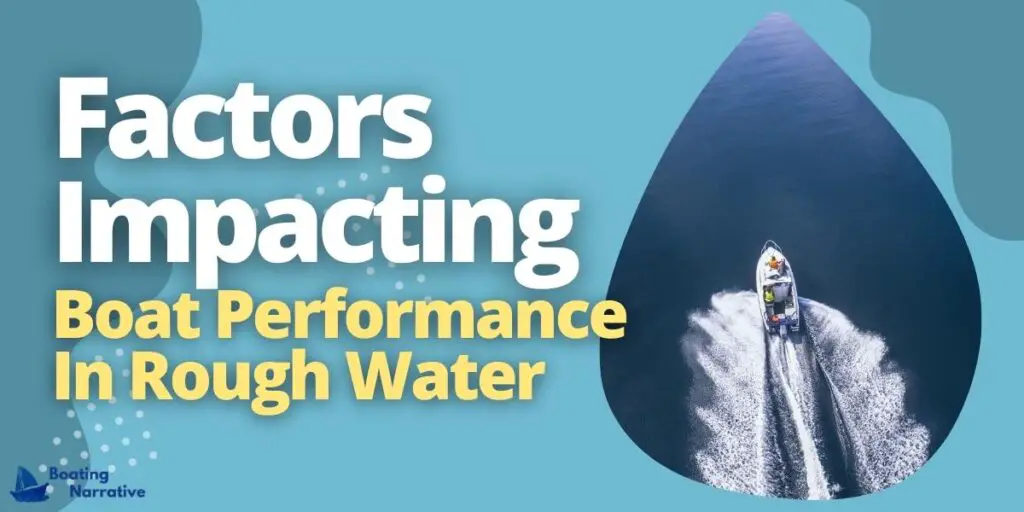
A boat’s performance in choppy water is influenced by a variety of factors. Some of these include the size and weight of the boat, the type of hull, and the power of the engine.
Bigger, heavier boats tend to do better in rough water than smaller, lighter ones. This is because they have more mass and are less likely to be tossed around by waves. They also tend to have deeper hulls, which helps them stay stable in choppy waters.
The type of hull also makes a difference. Boats with deep-V hulls tend to do better in rough water than those with shallow hulls. This is because the deep-V hulls provide more stability and can handle more waves without capsizing.
Finally, the power of the engine is a factor. Boats with more powerful engines can typically handle rougher water than those with weaker engines. This is because they have more power to push through waves and keep the boat moving forward.
Boat Engine’s Power to Handle Rough Water
A boat’s engine needs to be powerful enough to handle rough water. This means that the engine must be able to generate enough power to move the boat through the water, even when the water is choppy, or there is a strong wind.
- The amount of power that a boat’s engine needs to be able to generate depends on the size and weight of the boat.
- In comparison to a huge boat, a tiny boat may get by with a less powerful motor.
- The type of boat also makes a difference. A speedboat, for example, needs a more powerful engine than a fishing boat.
Best Type of Boat for Choppy Water
There is no definitive answer to this question as it depends on a number of factors, including the type of water you’ll be boating in, the size and weight of your boat, and your personal preferences. We may, however, categorize it into a few broad groups.
If you’re looking for a boat that can handle rough, choppy waters, you’ll want something with a deep V-hull. This hull design cuts through waves rather than riding over them, making for a smoother, more stable ride.
Boats with a shallower hull can be just as stable in calm waters, but they tend to be less comfortable and more susceptible to waves in rougher conditions.
Another factor to consider is the size and weight of your boat. Heavier boats are often more stable in choppy waters, but they can be more difficult to maneuver. Lighter boats, on the other hand, are easier to handle but may not be as stable.
In the end, you must decide what trade-offs you are willing to make.
How Does a Sailboat Handle Choppy Water?
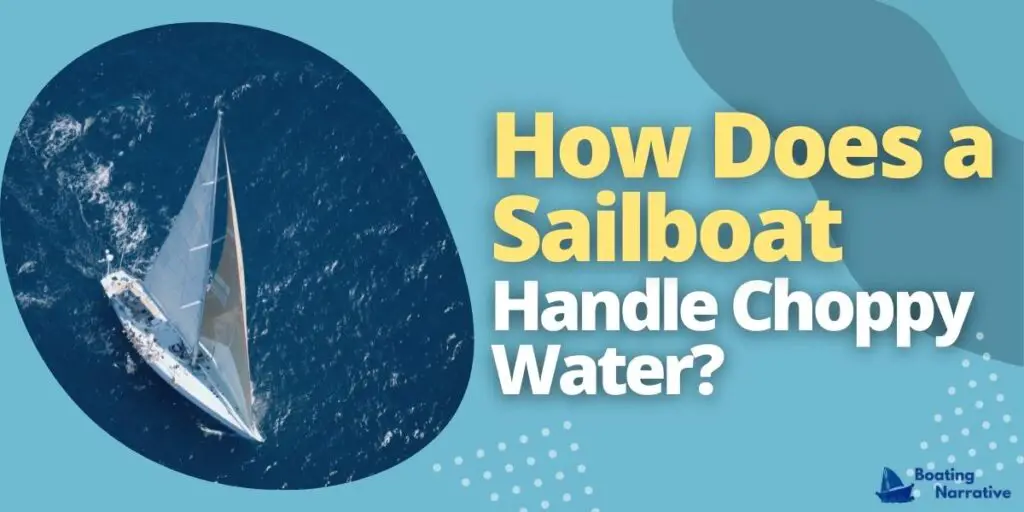
Sailboats are designed to handle choppy water. The hull of a sailboat is shaped to cut through the waves, and the keel helps to keep the boat stable. Sailboats also have a centerboard or daggerboard, which can be lowered into the water to help with stability.
How Do You Run a Boat in Rough Water?
Running a boat in rough water takes skill, knowledge, and practice. While it is possible to run a boat in rough water without incident, it is always best to be prepared. Here are some tips for running a boat in rough water:
- Know your boat: Before heading out in rough water, take some time to familiarize yourself with your boat. Know its capabilities and limitations. When running in rough water, this will assist you in making smarter decisions.
- Check the weather: Before heading out, always check the forecast. If the forecast calls for rough weather, it is best to stay at the dock.
- Use caution: When running in rough water, always use caution. This means paying attention to the waves and the wind and making sure that everyone on board is wearing a life jacket.
- Be prepared: In the event that you do end up in rough water, it is important to be prepared. If you need to abandon the ship, have a strategy in place. Make sure everyone on board knows the plan and where the life jackets are.
What Size Waves Can a Boat Handle?
A boat’s hull is designed to displace a certain amount of water. The deeper the boat sits in the water, the greater the amount of water it displaces and the more stable it is.
A boat’s weight also affects its stability. Heavier boats are more difficult to tip over than lighter boats.
The size of waves a boat can handle depends on the design of the hull, the weight of the boat, and the conditions of the water. In general, deeper hulls are more stable and can handle larger waves. Heavier boats are also more stable and can handle larger waves.
Most boaters have a pretty good idea of how big a wave their boat can handle. But, there are some things to consider when making that decision. The first is the size of the boat. A boat that is too small will be easily swamped by a big wave.
The second is the type of boat. A boat that is not designed for big water will be more likely to capsize in the following sea. The third is the experience of the boater.
A boater who is not experienced in handling a boat in big water is more likely to make a mistake that could result in a capsized boat.
How Do You Take Big Waves in A Small Boat?
In order to take big waves in a small boat, you need to have a few things. First, you need to have a boat that is seaworthy and able to handle big waves.
Second, you need to have the right equipment on board the boat, including the proper safety gear. Finally, you must be able to control the boat in large waves.
Be sure to practice handling the boat in big waves so that you are prepared for when you encounter them.
Avoid Boat Accidents and Damage in Rough Waters
Boat accidents happen every day, and many of them could have been avoided with proper precautions. In rough waters, it is especially important to be aware of your surroundings and take care not to damage your boat.
There are a few things you can do to avoid boat accidents and damage in rough waters.
- Be aware of your surroundings and pay attention to the weather conditions. If you see a storm coming, it is best to head to shore and wait it out.
- Make sure you have the proper safety gear on board, including life jackets and flares.
- Avoid drinking alcohol while boating. Alcohol impairs your judgment and can make it more difficult to operate your boat safely.
By following these simple tips, you can help to avoid boat accidents and damage in rough waters. Remember to always be aware of your surroundings and take precautions to keep yourself and your boat safe.
Is a Heavier Boat Better in Rough Water?
A heavier boat is not necessarily better in rough water. The weight of the boat can affect its performance in different ways. Heavier boats tend to be more stable in the water and are less likely to capsize.
They also tend to ride higher in the water, which can be an advantage in rough conditions. However, heavier boats are also more difficult to maneuver and can be slower to respond to changes in the water.
The best boat for rough water conditions depends on a number of factors, including the size and weight of the boat, the type of hull, and the experience of the boat operator.
In general, smaller and lighter boats are more maneuverable and responsive and can handle rough conditions better than larger and heavier boats.
Most Seaworthy Boat Design
There is no one design that is best suited for all water conditions and rough waters. Boat design refers to the way the boat is built, including its hull, deck, and sails.
Many boat designs are seaworthy in rough water. These include centerboard boats, bow-rider boats, catamaran-style boats with sailing rigs, and monohulls with deep keels.
The best boat for rough water is the largest one that can be safely operated. Larger boats are more stable and can handle rougher seas better than smaller boats. They also provide more space to ride out a storm, if necessary.
Conclusion
When it comes to choosing the best boat for rough water conditions, there is no one-size-fits-all answer. The best boat for you will depend on your specific needs and preferences.
It is important to do your research and choose the boat that is best suited for your specific needs.
- Rough water can be defined as water with waves that are higher than two feet.
- It is important to have a boat that can handle rough water conditions safely and efficiently.
- There are a variety of boats that are designed specifically for rough water conditions.
- Some of the most popular types of boats for rough water include catamarans, monohulls, and inflatables.
- Each type of boat has its own unique set of advantages and disadvantages.
- It is important to do your research and choose the boat that is best suited for your specific needs and preferences.

